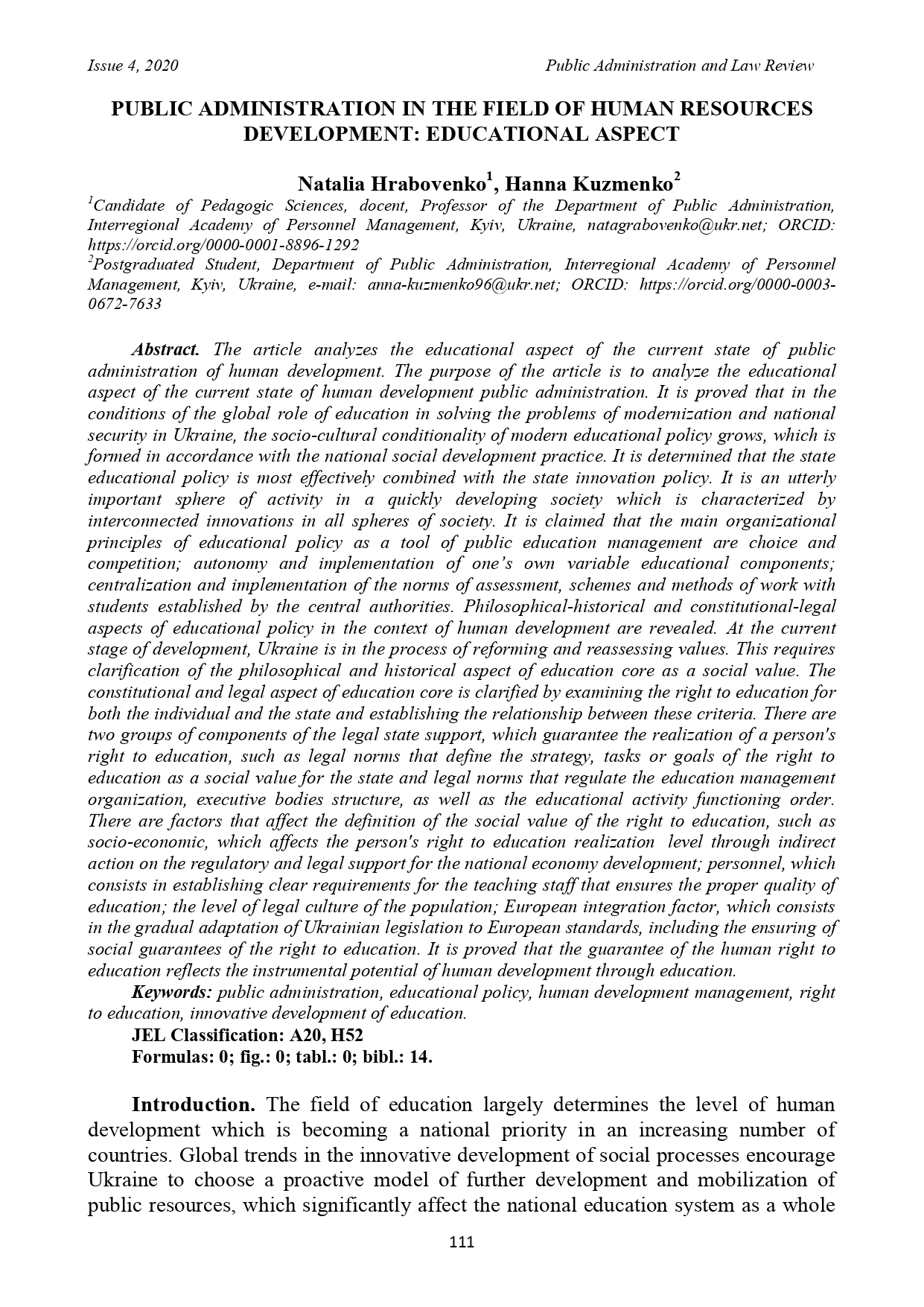PUBLIC ADMINISTRATION IN THE FIELD OF HUMAN RESOURCES DEVELOPMENT: EDUCATIONAL ASPECT
DOI:
https://doi.org/10.36690/10.36690/2674-5216-2020-4-111Keywords:
public administration, educational policy, human development management, right to education, innovative development of educationAbstract
The article analyzes the educational aspect of the current state of public administration of human development. The purpose of the article is to analyze the educational aspect of the current state of human development public administration. It is proved that in the conditions of the global role of education in solving the problems of modernization and national security in Ukraine, the socio-cultural conditionality of modern educational policy grows, which is formed in accordance with the national social development practice. It is determined that the state educational policy is most effectively combined with the state innovation policy. It is an utterly important sphere of activity in a quickly developing society which is characterized by interconnected innovations in all spheres of society. It is claimed that the main organizational principles of educational policy as a tool of public education management are choice and competition; autonomy and implementation of one’s own variable educational components; centralization and implementation of the norms of assessment, schemes and methods of work with students established by the central authorities. Philosophical-historical and constitutional-legal aspects of educational policy in the context of human development are revealed. At the current stage of development, Ukraine is in the process of reforming and reassessing values. This requires clarification of the philosophical and historical aspect of education core as a social value. The constitutional and legal aspect of education core is clarified by examining the right to education for both the individual and the state and establishing the relationship between these criteria.
There are two groups of components of the legal state support, which guarantee the realization of a person's right to education, such as legal norms that define the strategy, tasks or goals of the right to education as a social value for the state and legal norms that regulate the education management organization, executive bodies structure, as well as the educational activity functioning order.
There are factors that affect the definition of the social value of the right to education, such as socio-economic, which affects the person's right to education realization level through indirect action on the regulatory and legal support for the national economy development; personnel, which consists in establishing clear requirements for the teaching staff that ensures the proper quality of education; the level of legal culture of the population; European integration factor, which consists in the gradual adaptation of Ukrainian legislation to European standards, including the ensuring of social guarantees of the right to education. It is proved that the guarantee of the human right to education reflects the instrumental potential of human development through education.
Downloads
References
Elbing A.O. (1974) On the Applicability of Environmental Models / McGuire J. W. (ed.). Contemporary Management: Englewood Cliffs; N.J.: Prentice-Hall, P. 283.
Fullan M. (2007). The new meaning of educational change (4th ed.) – New York and London, Columbia University : Teachers College Press.
Lytsenko I. (2011) Reforming secondary education in Great Britain in the late twentieth - early twenty-first century. Pedagogical sciences. № 3(13), 133-140.
Gracheva T. (2004) The human right to education and its development in the context of globalization // Law and law. №3, 49 – 51.
Monaenko A.V. (2018) Features of financial activities of higher education institutions as law enforcement activities. Modern university legal education and science. Ternopil, Vol.1, 221-223.
The Constitution of Ukraine. Official web portal of the Verkhovna Rada of Ukraine. Retrieved from: http://zakon3.rada.gov.ua/laws/show/254%D0%BA/96-%D0%B2%D1%80
Decree of 14.08.2012 № 471/2012. On some issues of the National Academy of Public Administration under the President of Ukraine:. – Retrieved from: http://zakon2.rada.gov.ua/laws/show/471/2012.
Kirichenko VM, Sokolenko Yu.M. (2018) The impact of international human rights law on the Constitution of Ukraine. Scientific Bulletin of Dnipropetrovsk State University of Internal Affairs. № 3, 128-131. Retrieved from: http://www.irbis-nbuv.gov.ua/cgi-bin/irbis_nbuv/cgiirbis_64.exe?I21DBN=LINK&P21DBN=UJRN&Z21ID=&S21REF=10&S21CNR=20&S21STN=1&S21FMT=ASP_meta&C21COM=S&2_S21P03=FILA=&2_S21STR=nvdv_s_2018_3_27.
Kulinich O. (2014) The constitutional right to education in the objective and subjective sense. Yurydychnyy visnyk, № 1, 31−36.
Bonyak V. (2005) The constitutional right of man and citizen to education and its provision in Ukraine. Kyiv. 20 p.
Dolnikova L. (1984) The constitutional right to education of Soviet citizens. Saratov, p. 6.
Matuzova M., Malko A. (2004) Theory of State and Law: a textbook. Retrieved from: https://pravo-olymp.ru/wp-content/uploads/2013/04/TGP_Matuzov_Malko.pdf.
Karmanyuk O. (2012) Subjective rights and legal obligation in the context of the rule of law in Ukrainian society. Journal of Kyiv University of Law. № 3, 48 – 52.
Semenets-Orlova IA (2016) Modeling as a method of public management of educational change // Public Administration and Local Self-Government.Vol.№4 (31). Retrieved from: http://www.dridu.dp.ua/vidavnictvo/2016/2016_04(31)/7.pdf.

Downloads
Published
How to Cite
Issue
Section
License
Copyright (c) 2021 “Scientific Center of Innovative Researches” OÜ

This work is licensed under a Creative Commons Attribution 4.0 International License.





